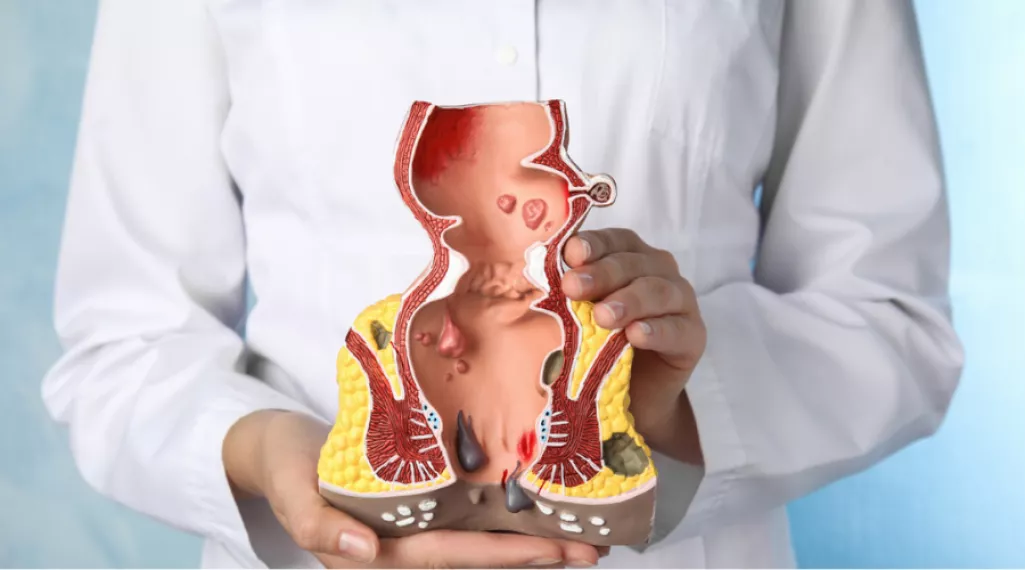
Bleeding Hemorrhoids: Top Treatments and Tips for Quick Relief
September 14, 2024
Hemorrhoids, also known as piles, are swollen veins located in the lower rectum and anus. They can cause discomfort, itching, pain, and in some cases, bleeding. While hemorrhoid bleeding is generally not severe, it can be alarming. If you’re dealing with bleeding hemorrhoids, rest assured that several effective hemorrhoid treatment options are available to help manage the condition and reduce discomfort. In this blog, we’ll cover the best treatments and precautions for bleeding hemorrhoids, so you don’t suffer needlessly.
Understanding Bleeding Hemorrhoids
Bleeding hemorrhoids often result from excessive straining during bowel movements, prolonged sitting, or increased pressure during pregnancy. These activities can irritate or rupture the swollen veins, leading to bleeding. You may notice blood on toilet paper, in the toilet bowl, or within your stool. While this condition can be uncomfortable, it’s rarely life-threatening. However, if you experience severe blood loss, dizziness, or fainting, seek medical attention immediately.
Top Bleeding Hemorrhoids Treatments
Fortunately, several treatments can provide relief from bleeding hemorrhoids. The best treatment for you depends on the severity of your symptoms and how long you’ve been experiencing the condition.
1. Over-the-Counter Medications
Many over-the-counter (OTC) medications are available to manage symptoms like pain, itching, and swelling. Common options include:
- Hydrocortisone Creams
- Hemorrhoid Suppositories
- Witch Hazel Pads
- Pain Relievers
2. Warm Sitz Baths
A sitz bath can provide soothing relief for bleeding hemorrhoids. Fill a tub with a few inches of warm (not hot) water and soak for 15 to 20 minutes. This helps reduce inflammation, calm irritated skin, and promote faster healing. Adding Epsom salts or baking soda can enhance the benefits. Take sitz baths two to three times a day, especially after bowel movements.
3. Increase Fiber Intake
Adding more fiber to your diet can soften stools, reducing the strain during bowel movements that aggravate hemorrhoids. High-fiber foods include:
- Whole grains like oats, brown rice, and whole wheat bread.
- Fruits such as apples, pears, and berries.
- Vegetables like broccoli, carrots, and leafy greens.
- Legumes, including beans, lentils, and chickpeas.
If dietary restrictions make it difficult to consume enough fiber, consider fiber supplements like psyllium husk or methylcellulose. Remember to drink plenty of water when increasing fiber intake to avoid digestive issues.
4. Stay Hydrated
Proper hydration is key to preventing hard stools that can irritate hemorrhoids. Aim to drink at least eight glasses of water daily, as this helps soften stools and makes bowel movements easier, reducing the pressure on hemorrhoids.
5. Practice Good Bathroom Habits
Making simple changes to your bathroom routine can greatly reduce the discomfort of bleeding hemorrhoids. Here are some helpful tips:
- Avoid straining when having a bowel movement. Take your time and relax.
- Use soft, unscented toilet paper or moistened wipes to gently clean the area.
- Don’t spend too long sitting on the toilet, as this can worsen hemorrhoids.
6. Cold Compresses
Cold compresses can help alleviate swelling and numb the pain caused by bleeding hemorrhoids. Use an ice pack wrapped in a cloth or a bag of frozen peas and apply it to the affected area for 10 to 15 minutes several times a day.
7. Medical Procedures
If home treatments don’t provide relief or if your hemorrhoids are severe, medical procedures may be necessary. Common options include:
- Rubber Band Ligation: A small rubber band is placed at the base of the hemorrhoid to cut off blood flow, causing it to shrink and fall off within a few days.
- Sclerotherapy: The doctor injects a chemical solution inside the hemorrhoid to make it smaller.
- Infrared Coagulation: Heat is used to cut off the blood supply to the hemorrhoid, causing it to shrink.
- Hemorrhoidectomy: A surgical procedure to remove large or painful hemorrhoids.
Tips for Preventing Bleeding Hemorrhoids
Preventing hemorrhoid flare-ups can be easier than treating them. Follow these tips to avoid future issues:
- Stay Active: Regular exercise promotes healthy digestion and prevents constipation, a common cause of hemorrhoids.
- Don’t Delay Bowel Movements: Go to the bathroom as soon as you feel the urge to prevent hard stools and excessive straining.
- Be Careful With Weight: Excess weight puts pressure on the veins in the rectal area, increasing the likelihood of developing hemorrhoids.
- Avoid Tight Clothes: Tight clothing, especially around the waist and legs, can restrict blood flow and worsen hemorrhoid symptoms. Opt for loose, comfortable clothes.
Conclusion
With the right treatments and lifestyle changes, you can manage and prevent bleeding hemorrhoids effectively. At the Digestive Institute of Arizona, we specialize in advanced care for conditions like bleeding hemorrhoids. Our experienced team is committed to providing compassionate and comprehensive treatment options to help you find relief. Contact us or book an appointment online today to learn more about how we can support your digestive health.
FAQs About Bleeding Hemorrhoid
1. How long will a burst hemorrhoid bleed?
Bleeding from a ruptured hemorrhoid typically lasts for a few seconds to a few minutes and may recur after bowel movements. However, it rarely lasts more than 10 minutes. Once the swollen tissue ruptures, the pressure is relieved, leading to improvement.
2. How should a person with hemorrhoids sit?
Avoid sitting on hard surfaces. Instead, use a cushion or soft seating to prevent additional pressure on the affected area and further swelling.
3. How should I clean a bleeding hemorrhoid?
Gently clean the area with water and a fragrance-free soap. You can also use baby wipes or medicated pads like Tucks. Wear cotton underwear and loose clothing to reduce moisture in the anal area.
4. Do bleeding hemorrhoids need to be removed?
Not all bleeding hemorrhoids require surgery. However, if they bleed excessively, cause significant pain, or become swollen and hard, surgical removal may be necessary.
5. How to stop bleeding hemorrhoids?
To stop bleeding hemorrhoids, use cold compresses, take warm sitz baths, and apply OTC creams or pads. Increase fiber intake and hydration to ease bowel movements, and avoid straining. If you’re wondering how to stop hemorrhoids from bleeding, these steps can help manage symptoms effectively.
6. Can hemorrhoids bleed without a bowel movement?
Yes, hemorrhoids can bleed even without a bowel movement. This may happen if the swollen veins become irritated from activities like prolonged sitting, heavy lifting, or excessive wiping. In some cases, external hemorrhoids can rupture due to pressure, leading to sudden bleeding.
